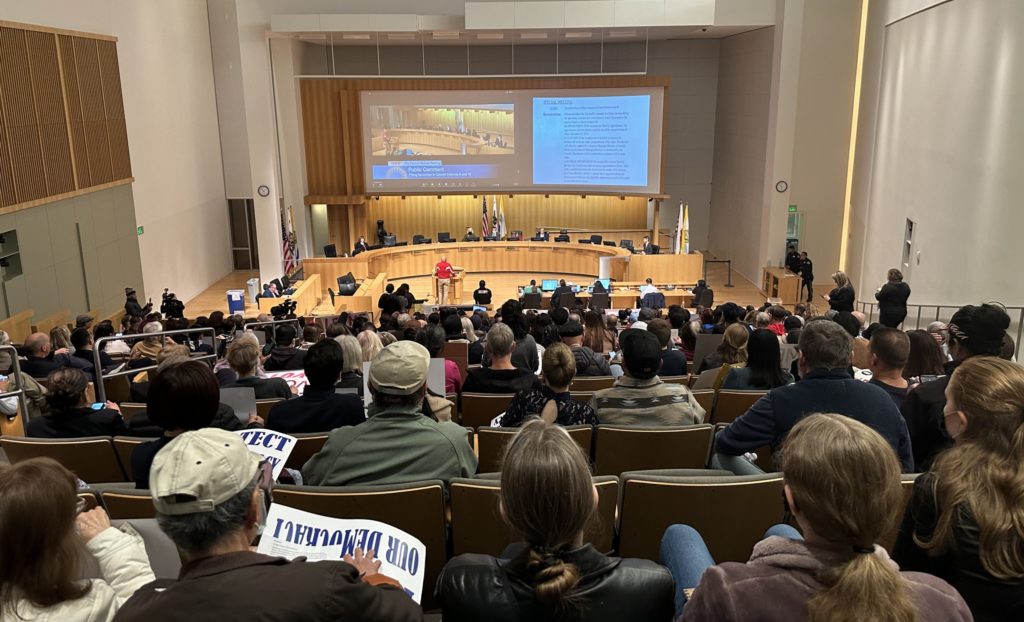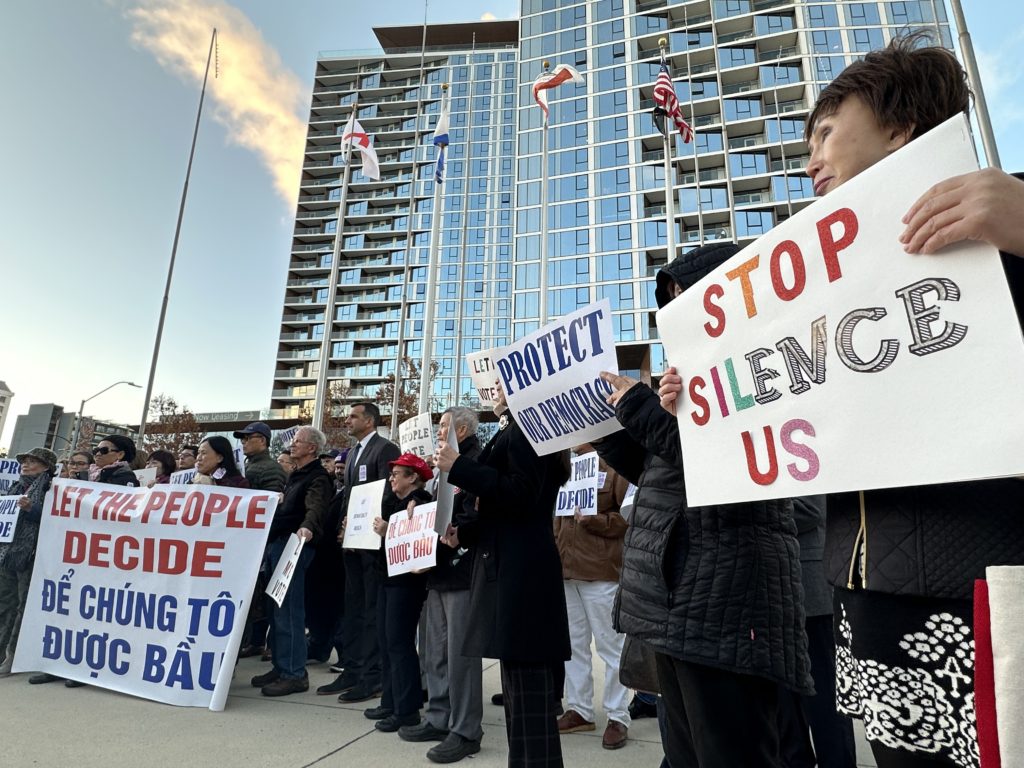Cheers, boos, middle fingers and the banging of a gavel filled the San Jose City Council chambers on Monday night as officials decided how to fill two vacancies.
After five hours of heated public comment from more than 500 people, councilmembers voted 7-4 late Monday to fill the vacancies through an appointment process by the end of January. Mayor Sam Liccardo, Vice Mayor Chappie Jones and Councilmembers Pam Foley and Matt Mahan voted in opposition.
“This is a clear break from precedent,” Liccardo said just before the midnight vote. “I think it brings shame to our city.”
Hundreds of residents at City Hall held up “let me vote” signs and shared impassioned pleas to move forward with a special election to replace District 10 Councilmember Matt Mahan and District 8 Councilmember Sylvia Arenas, who are moving on to new roles as San Jose mayor and Santa Clara County supervisor, respectively.
The council had three options to fill the seats: permanent appointment, a special election or picking an interim appointment prior to a special election taking place.
Those in favor of appointing new councilmembers criticized the $7 million to $10 million price tag and lengthy timeline for a special election, while those in favor of an election said residents deserve to elect their representatives.
I haven’t seen the council chambers this full in a VERY long time.
Doesn’t include the 300+ speakers on zoom.
Is this enough to sway a councilmembers vote and move forward with a special election?
(Keep up with this thread and @SJSpotlight to find out) pic.twitter.com/4JsbSIaZEf
— Jana Kadah (@Jana_Kadah) December 6, 2022
The discussion highlighted the political divide in San Jose and the results will determine if labor keeps its stronghold or if business can regain a majority in City Hall.
“I can list a few things that I believe can be fully funded with that money,” said Councilmember Sergio Jimenez. “Fully opening community centers, enhancing traffic safety to prevent deaths, park maintenance, rebuilding playgrounds—things we get calls about on a daily basis.”
Mahan countered that there is no price tag for democracy. His office even sent an email during the council meeting urging residents to speak in favor of an election.
“It is just a fact that a special election will be far more representative than nine of us making this decision,” Mahan said. “It will be tens of thousands of people out there paying attention, listening to the candidates, that will force the candidates to go through a long and arduous process of making their case.”

A bitter divide
The discussion was heated on the dais and during public comment. Attendees at City Hall booed a couple residents who want the council to appoint new members.
Bill James, chair of the Santa Clara County Democratic Party, couldn’t finish speaking because dozens booed after he told councilmembers to not be pressured by a “vocal minority” into supporting special elections.
Dennis Hawkins, a District 10 resident, said he supports an appointment because he worries waiting for a special election will leave his district unrepresented.
“One of the disadvantages of an election is that the residents of both District 8 and 10 will be disenfranchised in council decisions coming in the next few months, such as budget, zoning issues and things of that nature, because they will not have an active member on the council,” Hawkins said.
Numerous residents said they want to cast a ballot in a special election—arguing it’s their right. Before the meeting, dozens of residents rallied with Liccado, Mahan and Councilmember-elect Bien Doan outside City Hall to oppose an appointment process.

“It’s ever so clear that special interests have a stronghold on select members of our council,” District 10 resident Deborah Millner said during the meeting. “Ironically, the same people that have been screaming from the rooftops to count every vote, suddenly don’t want to count any votes and clearly have decided to disenfranchise 200,000 people, many of whom are minorities and women.”
Former Councilmember David Pandori accused some lawmakers of supporting an appointment to maintain the labor majority on the council.
“Democracy is not about efficiency. Justice is not about efficiency, it is about fairness,” Pandorini said. “Democracy gives a voice to the voiceless… that is what elections do. That is what the labor movement is supposed to do—they give a voice to the powerless and empower individuals to unite together. But for some reason, labor isn’t being true to that mission.”
Mahan, who is pro-business, wanted a special election and argued allowing residents to vote is a fundamental right that will allow true representation. Arenas, backed by labor, favored an appointment process to save time and money.
She said District 8 would be neglected during the budget process if the city waited to elect her successor.
“That means (there would not) be a representative for District 8 that is going to pipe up and talk about some of those special interests that we have in our community,” Arenas said. “(They would) not benefit for a whole fiscal year.”
But underneath the deliberations over price and principle is politics, political observer Terry Christensen said.
The council currently leans toward labor, which means there is a better chance of a labor candidate getting appointed—and strengthening the progressive grip. If the council chose to hold a special election, voters could’ve elected a business-leaning candidate and strengthened mayor-elect Mahan’s coalition on council.
“There’s clearly a majority for an appointment that would be friendly to (labor) politics. That’s a lot of what this is about,” Christensen told San José Spotlight. “On the other hand, if there’s a special election, voter turnout will be fairly low. When you get to that low, then you have a more affluent, older electorate that will tend to be more conservative.”
Voter turnout for special elections is historically low at about 20% to 30%, according to City Clerk Toni Taber.
Christensen said the vote illustrates the challenges Mahan may face to move his policies forward with a labor majority on the council.
“We’ll see more of that over the course of the next year or so, but who fills the seats will make a difference,” he said. “As limited as the powers of mayor in San Jose are, they have ways of making friends among councilmembers. It will take a lot for the progressive majority—if there is one in the new year—to resist what the mayor wants to do.”
Contact Jana Kadah at [email protected] or @Jana_Kadah on Twitter.



Leave a Reply
You must be logged in to post a comment.